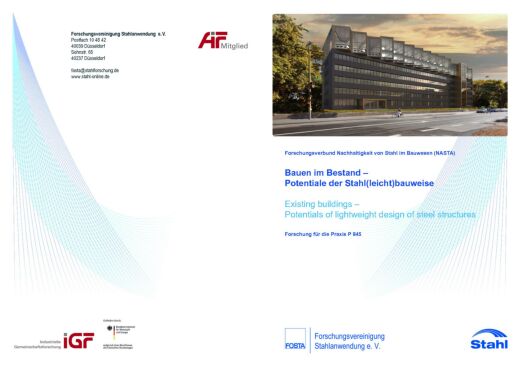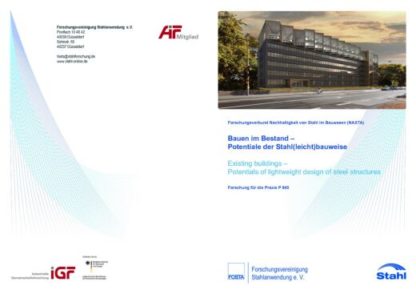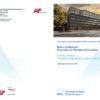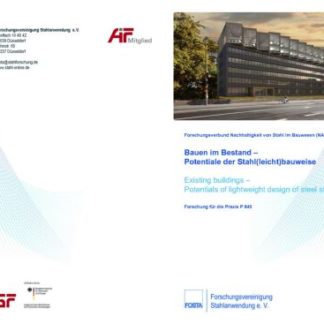Description
P 845 – Existing buildings – Potentials of lightweight design of steel structures
Generally, building in existing contexts is about compaction, modernization and restoration of existing buildings. For the following years the focus of construction industry is seen in this area. To handle the problem of long-term conservation and restoration of existing buildings, the holistic concept of sustainability provides a comprehensive basis for all stakeholders. In order to use the advantages of the steel lightweight construction, a broad basis, planning aids and assessment criteria are required. These criterions should fulfil all interdisciplinary (building) tasks considering urban planning, architectural and building physical aspects, static structural requirements, construction management, valuation of real estate and a life-cycle spreading optimization concerning sustainability.
The present research project has developed basics for every discipline of building in existing contexts. At this the focus was particularly on the expansion of existing buildings, especially in form of roof top extensions in steel (lightweight) construction. This includes an architectural and a structural design analysis of already realized extension projects and an overview of historical construction materials as well as the static and constructive assessment of existing constructions. Furthermore, the opportunity of using sandwich elements for the façade with the focus on construction, details and modularity was analysed. In light of the continuous reduction of the heat and primary energy demand, the integration of latent heat accumulators for the summer thermal insulation was analysed. This improved summer thermal insulation lead to a lower demand of cooling in summer. In addition, the construction management planning of the construction sites, especially in urban areas with the focus on building in existing contexts, constitutes another central aspect of the analysis. The sustainability analyses based on these aspects serve as a support of the project development for existing building projects. For this purpose, assessment approaches and definitions of system boundary for existing buildings have been worked out for the three dimensions of economy, ecology and society.
For the first time, detailed life cycle assessment results for specific structural alteration works on existing buildings are now available, which help to assess the different scenarios of demolition and a new construction. Also economic benefits of the building in existing contexts can be shown. The application of the relevant assessment criteria is shown with the example of selected buildings, which were built with reinforced concrete frame construction in the 1960s and 1970s.
The sum of the results, which were achieved in this research project, constitutes a guideline for the planner, even in an early planning phase, to deal with existing buildings.
The research project (IGF-Nr. 16598 N) was carried out at Technischen Universität Dortmund vom Lehrstuhl Stahlbau, at Lehrstuhl Baukonstruktion und vom Lehrstuhl Baubetrieb und Bauprozessmanagement, at Karlsruher Institut für Technologie (KIT), Versuchsanstalt für Stahl, Holz und Steine, at Technischen Universität Braunschweig at Institut für Werkzeugmaschinen und Fertigungstechnik, at Institut für Trocken- und Leichtbau gGmbH and at Technischen Universität Darmstadt vom Fachgebiet für Tragwerksentwicklung und Bauphysik. FOSTA has accompanied the research project work and has organized the project funding from the Federal Ministry of Economics and Technology through the AiF as part of the programme for promoting industrial cooperation research (IGF) in accordance with a resolution of the German parliament.
Only available in german language.
Authors:
D. Ungermann, A. Patschin, A. Pätzold, E. Prechwinkel, P. Floerke, S. Weiß, M. Gralla, T. Brandt, T. Ummenhofer, M. Herrmann, T. Zinke, C. Herrmann, T. Dettmer, K. Tichelmann, B. Ziegler
Published in:
2016




